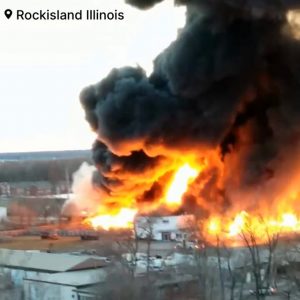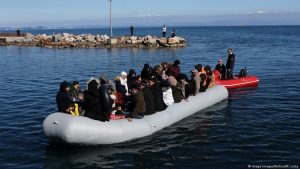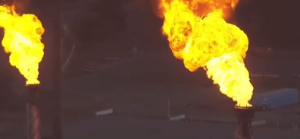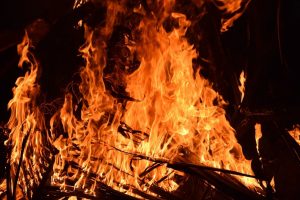Thousands of asylum seekers on the Greek island of Lesbos faced a third night in the open after the country’s largest camp burned down, as France, Germany and the Netherlands Thursday offered to take in hundreds of them, especially children.
Desperate families, many with young children were living rough, homeless and hungry, many without tents or even basic bedding.
“We’ve lost everything, we were abandoned, without food, water or medicine,” said Fatma Al-Hani, a Syrian woman who barely had time to grab her identity papers before the flames engulfed the camp.
Also Read: Fire destroys Greece’s largest migrant camp, hundreds forced to flee
Germany and France on Thursday agreed on an initiative for EU states to share out some 400 minors from the camp, a source close to the talks told AFP.
“As a preliminary step we are offering to Greece to accept refugees who are minors — other steps must follow,” German Chancellor Angela Merkel told a panel discussion in Berlin.
The European Union must “finally assume more shared responsibility” for migration policy, Merkel said.
Greek Prime Minister Kyriakos Mitsotakis wants that kind of sentiment transformed into action.
“Europe must move from words of solidarity to a policy of acts of solidarity. We have to put the migration crisis at the heart of our discussions and be much more concrete,” he said later Thursday at a summit of Mediterranean leaders in Corsica.
The Netherlands offered to take in 100 of the migrants, half of them minors.
The fire late on Tuesday at Moria camp, Greece’s most notorious migrant facility, sent thousands fleeing for safety into surrounding olive groves.
Gaelle Koukanee, a pregnant 21-year-old Congolese refugee, said the police had fired tear gas during the operation to extinguish the fire.
“We have children, old people, disabled among us. Why this lack of humanity?” she asked, seeking shelter from the beating sun under an olive tree.
The minors in the Moria camp have been flown off Lesbos island and rehoused in “safe” facilities in northern Greece, Athens said, adding that all had been tested for the virus.
But the Greek government had bigger problems close at hand, with local authorities resisting plans to temporarily set up campsites for the homeless.
Near the smouldering ruins of Moria, local residents set up roadblocks to prevent a cleanup operation to make room for new tents.
“Now is the time to shut down Moria for good,” Vangelis Violatzis, a local municipal leader, told AFP.
Also Read: Fire near Greek archaeological site of Mycenae dies down
“We don’t want another camp, and we will oppose any construction work. We’ve faced this situation for five years, it’s time for others to bear this burden,” he said.
Another fire briefly broke out inside the camp Thursday.
Greek officials have declared a four-month emergency on the island and flew in extra riot police.
While nobody was seriously hurt, the Tuesday blaze destroyed the official part of the camp, which housed 4,000 people, ministers said.
A second fire broke out late on Wednesday, destroying most of the remaining camp where another 8,000 lived in tents and makeshift shacks around the perimeter, the migration ministry said Thursday.
The ministry said a ferry had been sent to accommodate hundreds of people ahead of the expected arrival of European Commission vice-president Margaritis Schinas to inspect conditions on the island.
“Today all necessary actions will be taken to immediately shelter families and vulnerable persons to begin with,” the ministry said.
Two Greek navy vessels would provide additional sleeping space, the ministry said.
Earlier this year, a plan to build a new camp on Lesbos stalled after locals clashed with riot police to prevent the construction.
Greek President Katerina Sakellaropoulou on Thursday said the situation had to be addressed without any “delays, responsibility-dodging, war cries”.
Migration minister Notis Mitarachi on Wednesday said asylum seekers had started the fire because of quarantine measures imposed after 35 people at the camp tested positive for coronavirus.
Greece’s public health authority EODY said eight of the 35 positive cases had been located and isolated along with a significant number of their close contacts.
Since becoming one of the main gateways into Europe for migrants and asylum seekers in 2015, Greece has built dozens of detention centres around the country.
But with other European nations accepting only a small trickle of refugees, thousands remain trapped in the Greek camps in usually dismal health conditions.
“We lacked toilets, showers and as women, we were afraid to walk at night. But now I’m even more worried about my future,” the Congolese refugee Koukanee said.
Greece’s conservative government has also toughened its asylum restrictions, slashing cash benefits and accommodation provisions to discourage further migration.
“This is Europe?” asked Fatma, clutching her two-year-old son.
“I’ve had enough, I just want my baby to grow up in peace,” she said, breaking down in tears.





